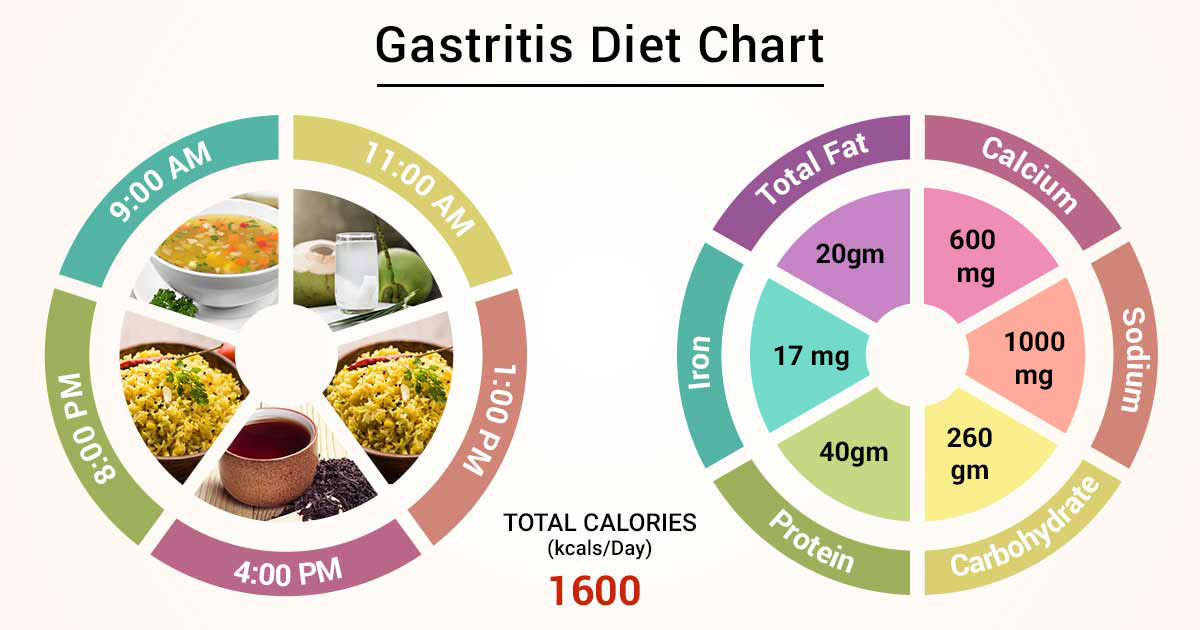Diet Plan for Chronic Gastritis
Diet Chart For gastritis
About Diet Chart Food Items To Limit Do's And Dont's Food Items You Can Easily Consume
Gastritis diet is required to help against gastritis. Gastritis occurs when the stomach lining and the gastrointestinal tract get inflamed. Since gastritis is a digestive condition, amending your diet to incorporate dietary practices that will reduce gastritis is immensely helpful. Avoiding certain foods and adding others is a sure way to manage gastritis. The following are some basic aspects of the gastritis diet that should be taken note of: Do's: Don'ts: About

Diet Chart
Sunday Breakfast (8:00-8:30AM) Vegetable soup (1 cup) Mid-Meal (11:00-11:30AM) Tender coconut water (1 cup) + 1 Apple (Unskinned) Lunch (2:00-2:30PM) Khichdi (1/2 cup) Evening (4:00-4:30PM) Boiled Black grams (1/3rd cup) + Black Tea (1 cup) Dinner (8:00-8:30PM) Khichdi (1/2 cup) Monday Breakfast (8:00-8:30AM) Boiled White Chickpeas n Tomato (1 cup) Mid-Meal (11:00-11:30AM) Tender coconut water (1 cup) + Grapes (1/2 cup) Lunch (2:00-2:30PM) Chapati (2) + Fish(1pc.) stew Evening (4:00-4:30PM) Roasted Rice Flakes (1/2 cup) + Black Tea (1 cup) Dinner (8:00-8:30PM) Boiled Rice (1/2 cup) + Baked Pumpkin (1/3rd cup) Tuesday Breakfast (8:00-8:30AM) Carrot soup (1 cup) Mid-Meal (11:00-11:30AM) Tender coconut water (1 cup) + Pomegranates (1/2 cup) Lunch (2:00-2:30PM) Boiled rice (1/2 cup) + Cabbage curry (1/3rd cup) Evening (4:00-4:30PM) Boiled Potato n Black grams (1/2 cup) + Black Tea (1 cup) Dinner (8:00-8:30PM) Boiled Rice (1/2 cup) + Mashed potato(2) + 1tsp Ghee Wednesday Breakfast (8:00-8:30AM) Vegetable soup (1 cup) Mid-Meal (11:00-11:30AM) Tender coconut water (1 cup) + 1 Guava Lunch (2:00-2:30PM) Carrot Uttappam (1) + Raita (1/3rd cup) Evening (4:00-4:30PM) Puffed Rice (1/2 cup) + Black Tea (1 cup) Dinner (8:00-8:30PM) Khichdi (1/2 cup) Thursday Breakfast (8:00-8:30AM) Baked Tomato n Brolli wity bell peper soup (1 cup) Mid-Meal (11:00-11:30AM) Tender coconut water (1 cup) + Ripe Papaya (1/3rd cup) Lunch (2:00-2:30PM) Chapati (2) + Baked vegetables (1/2 cup) + Raita (1/3rd cup) Evening (4:00-4:30PM) Boiled Black grams (1/3rd cup) + Black Tea (1 cup) Dinner (8:00-8:30PM) Boiled Rice (1/2 cup) + Bottle gourd curry (1/3rd cup) Friday Breakfast (8:00-8:30AM) Broccoli n Bell peper soup (1 cup) Mid-Meal (11:00-11:30AM) Tender coconut water (1 cup) + 1 Orange Lunch (2:00-2:30PM) Boiled Rice (1/2 cup) + Lentil soup (1/2 cup) Evening (4:00-4:30PM) Roasted Rice Flakes (1/2 cup) + Black Tea (1 cup) Dinner (8:00-8:30PM) Boiled Rice (1/2 cup) + Fish(1pc.) stew (1/3rd cup) Saturday Breakfast (8:00-8:30AM) Carrot n Beetroot soup (1 cup) Mid-Meal (11:00-11:30AM) Tender coconut water (1 cup) + 2 Chikus Lunch (2:00-2:30PM) Dosa (1) + Samber (1/2 cup) Evening (4:00-4:30PM) Boiled Potato n Black grams (1/2 cup) + Black Tea (1 cup) Dinner (8:00-8:30PM) Boiled Rice (1/2 cup) + Pointed gourd(without seeds n Unskinned) Curryurry Food Items To Limit
Do's And Dont's
Food Items You Can Easily Consume
Diet Plan for Chronic Gastritis
Source: https://www.lybrate.com/topic/gastritis-diet


Komentar
Posting Komentar